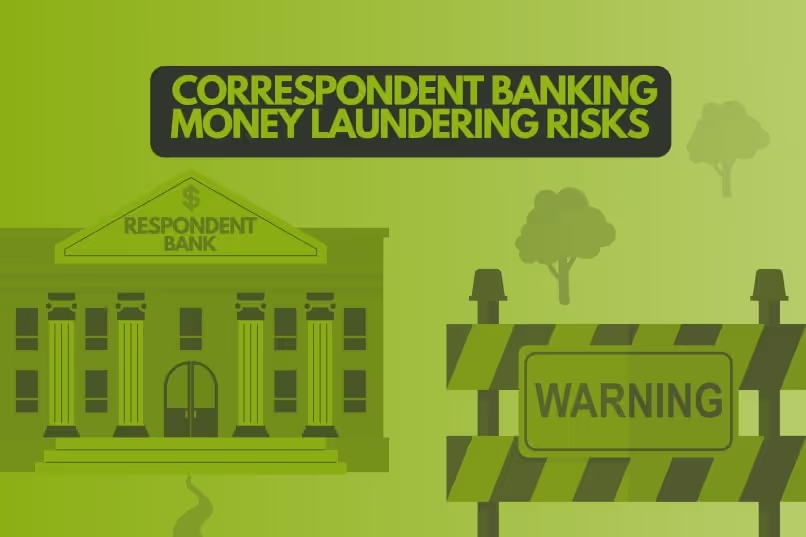
Understanding Correspondent Banking Risks
Correspondent banking is essential for the global payment system to work. Why? Because it facilitates cross-border transactions, including in developing economies and emerging markets. But there is a glaring problem. Money launderers target the correspondent banking system because of its weaknesses, such as a web of complex transaction chains and a convenient (for criminals) lack of transparency.
What Are Correspondent Banks?
According to the Financial Action Task Force (FATF), correspondent banks provide financial services to another bank - the respondent bank. Here are some of them:
- International wire transfers
- Check clearing
- Payable-through accounts (PTAs)
- Foreign exchange services
And let's create an analogy that everyone understands. It's similar to global airline alliances, albeit on a far larger scale and more complex. The idea is this: Forming partnerships between entities within their respective industries allows companies to sell their products and services in countries where they don't operate.
So, in the case of airlines, they can sell flights to destinations where they don't fly. The customer seamlessly buys one ticket from A to B but uses two airlines and connects at a hub airport.
And in correspondent banking - there are similarities. Banks form relationships where one bank provides services on behalf of another bank in sectors and geographic locations where they cannot provide it themselves.
It becomes even more complicated when multiple banks are involved in a chain of transactions serving a financial relationship between customers in different jurisdictions.
Money Laundering Through Correspondent Banking
Money laundering through correspondent banking is when criminals funnel illicitly obtained funds through the complex network of correspondent banking relationships. It's a significant problem for financial crime fighters in law enforcement and industry, especially because the illegal profits originate from heinous crimes, such as contract killings and drug trafficking.
Here are some of the most tangible reasons why the correspondent banking system is so attractive to criminal groups cleaning dirty money:
- Complex transaction chains
- Lack of transparency
- Cross-border nature
- Limited regulatory oversight
- Large transaction volumes
- Access to the global financial system
And why do money launderers specifically seek all of the above? Because they are layering their illicit funds.
Money laundering through correspondent banking is most prevalent in the layering stage of money laundering. Criminals create a labyrinth puzzle between them and illegally-gained money. The overall objective is to maximize the probability that financial crime sleuths hit a dead end (should any investigation even be initiated).
Here are some of the tangible tactics they use through the correspondent banking system:
Layering
As mentioned, money launderers target the correspondent banking system in the layering stage. It's common for criminals to make multiple cross-border payments between various correspondent banks, making it more difficult for investigators to track it to the source.
Smurfing & Structuring
Although they are different, smurfing and structuring involve the same technique: Splitting large financial transactions into smaller ones to avoid detection or reporting requirements. Breaking up a large amount of illicitly-gained cash into parts - and then making international transactions through the correspondent banking system is a common method money launderers use.
Shell Companies
Shell companies and money laundering are often two sides of the same coin (you can learn more about it in this sanctions.io blog post). Money launderers use shell companies registered in jurisdictions with strict privacy laws to conceal their identities from investigators. They can make cross-border financial transactions of dirty money through the correspondent banking system under the legal entity of the shell company.
And the bottom line is this: Multiple transactions (layering), smurfing and structuring techniques (breaking up the dirty cash), and using shell companies (utilizing strict privacy laws) working in unison, create a formidable challenge for financial crime fighters.
Money launderers will also create operations in countries with inadequate due diligence procedures, lax laws, and weak regulations concerning correspondent banking.
FATF's Guidance on Correspondent Banking
The FATF, the global financial crime watchdog, provides essential guidance to banks and other entities on dealing with money laundering and financing terrorism risks associated with correspondent banking.
The guidance covers processes that are part of the Know Your Correspondent Bank (KYCB) umbrella, which because of its importance, we expand on in the next section. But first, here are some of the key FATF recommendations:
- Perform due diligence on the respondent bank
- Develop an understanding of the respondent bank's business
- Verify the respondent bank's information
- Manage the risk (ongoing transaction monitoring and due diligence)
- Create clear terms governing the correspondent banking relationship
It may surprise some people, especially the general public, that banks don't automatically adopt the above FATF guidance in correspondent banking relationships. As financial institutions are subject to varying laws and regulations, depending on the jurisdiction, they all operate differently.
Ultimately, most banks will naturally maximize commercial operations while working within the law - rather than making sure they follow recommendations that may not be legally binding where they operate. Banks also will take their own approach to risk exposure and may even choose a high-risk strategy.
The Importance of KYCB in Correspondent Banking and Money Laundering
As alluded to in the previous section, Know Your Correspondent Bank (KYCB) refers to the due diligence process (to varying levels) that financial institutions undertake to assess the risk associated with their correspondent banking relationships.
Correspondent banks conduct KYCB procedures to gather information and evaluate the respondent institution's compliance with anti-money laundering (AML) and counter-terrorism financing (CTF) regulations. The following processes are recommended:
- Verify the identity and legal existence of the respondent bank
- Review the respondent bank's AML/CTF procedures
- Assess the respondent bank's risk management practices
Banks can reduce risk exposure by forming robust KYCB processes and continuously assessing their respondent banks' ongoing compliance with AML and CTF regulations.
Final Thoughts
Massive amounts of dirty money is laundered through correspondent banking 364 days the year. It's a significant issue that many AML professionals (especially in banks) on the frontline of financial crime deal with in their day-to-day job.
The issue is complex. A correspondent bank - providing financial services to a respondent bank it has an alliance with - is exposed to increased risk by customers who haven't completed their Know Your Customer (KYC) checks as direct clients do. That responsibility, crucially, usually lies in the hands of the respondent bank.
Therefore, actions such as KYCB help correspondent banks evaluate the risk associated with a respondent bank. In this process, sanctions screening, for example, is a necessity. Why? Because sanctioned individuals and entities are high risk for illegal money laundering activity.
7-Day Free Trial (No Credit Card Required)
We offer a free 7-day trial (no credit card is required) and will be delighted to walk you through our sanctions and criminal watchlist screening service and answer all your queries regarding the sanctions.io API, integrations, and more. Book a free Discovery Call now.
sanctions.io is a highly reliable and cost-effective solution for sanction checking. AI-powered and with an enterprise-grade API with 99.99% uptime are reasons why customers globally trust us with their sanctions screening needs.



